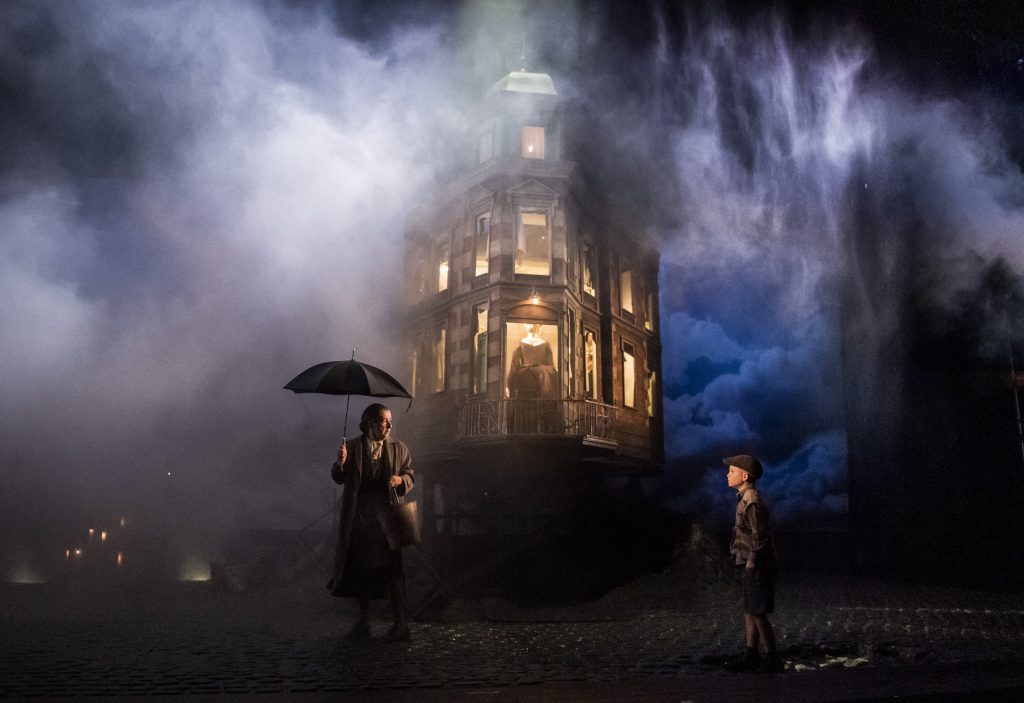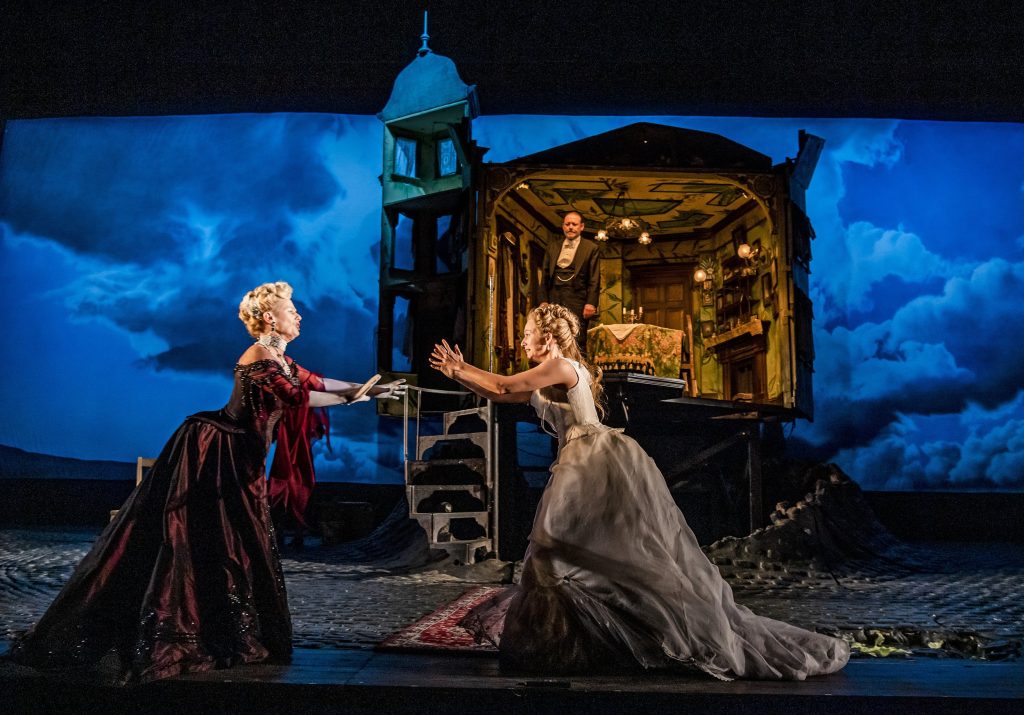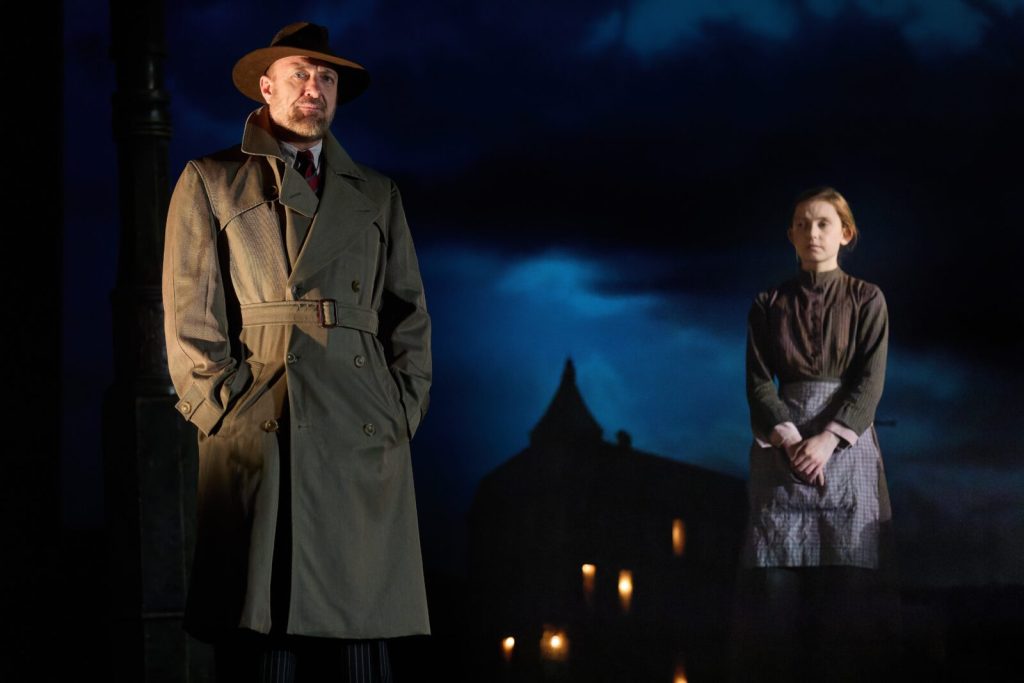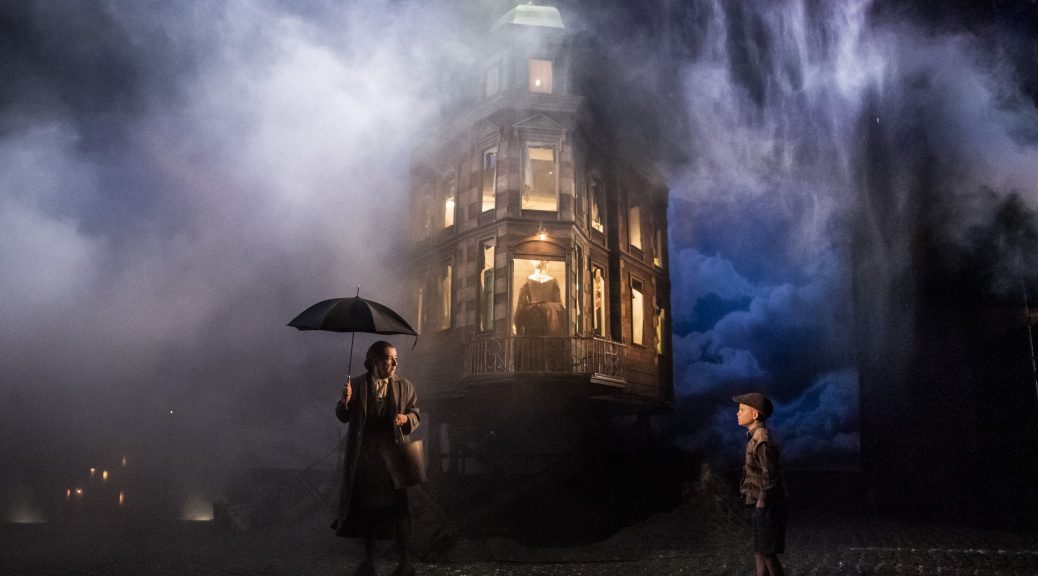
 (4 / 5)
(4 / 5)
An Inspector Calls is a staple of English Literature GCSE; we’ve all grown up knowing the twists and turns of J.B Priestley’s classic play. I remember vividly studying it and even playing Shiela Birling in an amateur production, so I know the play well. This is a production that rips up the basic setting of the upper-class drawing room and engagement party that Inspector Goole intrudes upon, with unwelcome news. This is a moody, smoky, gritty production that really emphasises the themes of society, class, gender and generational divide.
The set is extremely impressive. I loved the ‘doll’s house’ Birling household, with them being closeted away inside away from the audience’s view as the curtain lifts. It stands on stilts above the street below, keeping the Birlings and their perfect world away from the gutter, out of the view of the lower end of society. The front of the house opens up to begin their descent, swinging open to reveal their garish opulence, which stands starkly against the grey drabness of the street below. The Inspector arrives and bridges the gap, slamming steps against their home to be able to force them to descend to the streets below. The house plays an important part later on too, which I won’t spoil, but this further visceral vision of the collapse of this affluent family is excellent and drew gasps from the audience.

I also loved the costuming, with each character revealing their own unravelling. Sheila becomes more and more undressed as the show progresses, with her beautiful white gown having less and less fabric as action unfolds. Gloves are removed, shoulders taken off, leaving bare shoulders and arms. The other cast are disrobed in similar ways. Eric especially is dishevelled and unkempt upon his return; Mrs Birling’s perfect hair cascades messily down her face.
Tim Treloar as Inspector Goole walks through the darkness of the auditorium to the stage, his figure standing tall and forlorn in the single ray of the streetlamp. We have a Welsh Inspector here, a fact made altogether more impressive by the fact that this is a change specifically for the Wales Millennium Centre residency. The accent adds an extra element to the performance; ensuring that Goole stands apart from the Birlings, not quite fitting in anywhere to the fictional industrial town of Brumley, England. His performance was not what I was expecting at all; this Inspector is sometimes funny, passionate, clearly passionately involved in the tale of Eva Smith and her untimely demise. It makes him more human than previous iterations I have seen; his humour breaking the sometimes almost unbearable tension of the scenes and, of course, immediately gains him the empathy and support of this Cardiff crowd!

An Inspector Calls 2024. Tim Treloar (Inspector Goole) and Alice Darling (Edna). Photo by Mark Douet
He is joined by an excellent cast; Jackie Morrison owning every inch of the stage in her opulent gown as Mrs Birling; Philip Stewart is our understudy Mr Birling and brings the upper-class bluster and self-importance of Birling in spades. The younger side of the family are played to great effect by Leona Allen as Sheila Birling and George Rowlands as Eric Birling. Tom Chapman completes this ensemble as Gerald Croft, bridging that gap between the older and younger generations with ease. I also thoroughly enjoyed the ever-present Edna played by Alice Darling, her fair skin and quiet demeanour constantly reminding us of the lost Eva Smith and being an unending reminder of the effects that this family have had on a girl just like her.
This is a production which is unafraid of silences, poignant pauses and tableaus which really drive home every piece of symbolism and theme of the script. The image of the Birlings brought low by the Inspector, wrapped in blankets on the cobblestones beneath the very house they presided from is one that will stay with me for a long time. I enjoyed the use of the young actors throughout the piece and the ensemble serves to remind us that we are one society and those who forget that do so at their peril. This is ably directed by Stephen Daldry (with assistance from Charlotte Peters) and ensures that the audience sees this very well-known script with a whole new set of eyes. My only tiny complaint was that we lose some of the dialogue full of foreshadowing and dramatic irony at the beginning, with the house remaining closed slightly longer than I would have liked. But this is a very small grumble in an otherwise well executed, smart production.
Moody, atmospheric, with spades of tension to boot; I love the original, but I’m pleased to report that this adaptation maintains that whilst adding many more layers and creating a version that will stay with the studiers of this GCSE piece. Ultimately, I think that is what is important; maintaining the integrity and message of the original whilst compounding its importance for the future generations that are, and will be, reading it in class. The audience, both young and old, leave with ‘fire and blood’ in their minds, left with the message of ‘one society’ that is more important now than ever, almost 80 years after it was first produced in the West End.


I am pleasantly reminiscing the morning after thoroughly enjoying the experience at Venue Cymru last evening.
Whilst the taxing and interrogation of Tim’s Inspector Goole against the various family members was delivered with strength and empathy for the absent Evie I think that the quietly menacing interpretation adopted by Alastair Simm in the 1954 film production was more interpretative of a “ ghoul / Goole” and the fear that the challenging appearance of the Inspector was intended by Priestly.
Notwithstanding that opinion I was engrossed by the whole production and in great admiration of the presentation by Leona Allen as Sheila Birling and the continued haunting presence of Edna.
Well done Llandudno and Venue Cymru … can I suggest looking for “ My three angels “ evoking a similar memory of deep engrossment many years ago at Bolton Octagon Theatre.